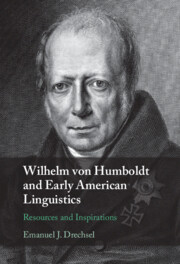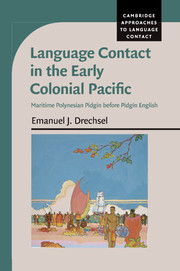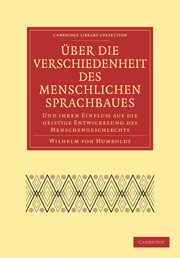Wilhelm von Humboldt and Early American Linguistics
Wilhelm von Humboldt (1767–1835), an early pioneer in the philosophy of language, linguistic and educational theory, was not only one of the first European linguists to identify human language as a rule-governed system –the foundational premise of Noam Chomsky's generative theory – or to reflect on cognition in studying language; he was also a major scholar of Indigenous American languages. However, with his famous naturalist brother Alexander 'stealing the show,' Humboldt's contributions to linguistics and anthropology have remained understudied in English until today. Drechsel's unique book addresses this gap by uncovering and examining Humboldt's influences on diverse issues in nineteenth-century American linguistics, from Peter S. Duponceau to the early Boasians, including Edward Sapir. This study shows how Humboldt's ideas have shaped the field in multiple ways. Shining a light on one of the early innovators of linguistics, it is essential reading for anyone interested in the history of the field.
- Introduces the key concepts of Wilhelm von Humboldt's understanding of language to an Anglophone audience
- Provides a historical perspective of Humboldt's influence on subsequent generations of Americanist linguists
- Draws on an interdisciplinary perspective, including biography, ethnohistory, and philology (defined in modern terms)
Reviews & endorsements
'In an agreeable style, and with an impressive depth of scholarly erudition, Drechsel argues cogently that Humboldt not only nourishes American linguistics but engaged in a mutually enlightening dialogue with American scholars. This contribution highlights the significance of Humboldt's thinking for linguistic anthropology worldwide, and will be welcomed by linguistics and translation scholars as a fine contribution to the new wave of Humboldt scholarship in Germany and the English-speaking world.' James W. Underhill, Full Professor of Translation and Ethnolinguistics, University of Normandy
'In this fascinating exploration of some of the most critical issues facing early American linguistic anthropology, Emanuel Drechsel has resuscitated von Humboldt as an incipient Americanist, sociolinguist, and field worker, who set the stage for much of the current theoretical work in linguistics and anthropology. His case for recasting linguistic relativity more accurately as the 'Humboldt-Sapir-Whorf Hypothesis' makes for fascinating reading alone, and clarifies much of the current debate.' James Stanlaw, Professor of Anthropology at Illinois State University
Product details
January 2024Adobe eBook Reader
9781108967792
0 pages
This ISBN is for an eBook version which is distributed on our behalf by a third party.
Table of Contents
- Preface
- Acknowledgments
- List of Figures
- Part I. Wilhelm von Humboldt and the Americas: Essentials
- 1. Introduction: The Elder Humboldt as an Americanist Linguist and Anthropologist
- 2. Research on Wilhelm von Humboldt and His Brother Alexander as Americanist Linguists: Biography, Ethnohistory, and Philology
- Part II. The Early Lives of Wilhelm and Alexander von Humboldt
- 3. The Humboldt Brothers' Youth and Bildung in Europe of the Late Eighteenth Century
- 4. Alexander von Humboldt on His Explorations of the Americas and in His Role as His Brother's Intermediary (1799–1804)
- 5. Wilhelm von Humboldt's Linguistic and Ethnographic Field Experiences with Basque in the Pyrenees of Spain (1799 and 1801)
- Part III. Wilhelm von Humboldt's Americanist Linguistics
- 6. First Exposure to American Languages at the Vatican Library in Rome and the Significance of Alexander's American Resources (1803–1808)
- 7. Expansion and Intensification of Humboldtian Americanist Linguistics: Methodological and Theoretical Implications (1811–1819)
- 8. Les langues du Nouveau Continent: An Early Book on the American Languages in the Making, but Falling Short (1820–1827)
- 9. From the Americas to the Pacific: Americanist Linguistics as Methodological-Conceptual Midwife to the Study of Malayo-Polynesian Languages (1827–1835)
- Part IV. Wilhelm von Humboldt's Impact on Americanist Linguistics and Anthropology
- 10. First Generation of American Humboldtians of the Early Nineteenth Century: American Languages in a Comparative Linguistics (Duponceau, Pickering, and Gallatin)
- 11. Second Generation of American Humboldtians in the Nineteenth Century: Language Typology, History, and Evolution (Lieber, Gatschet, and Brinton)
- 12. Third and Fourth Generations of American Humboldtians at the Turn of Nineteenth Century: Linguistic and Cultural Relativism (Boas, Kroeber, and Sapir)
- Part V. Wilhelm von Humboldt as an Americanist Linguist and Anthropologist
- Summary
- Conclusions
- References
- Appendix 1: List of Abbreviations for Frequently Used Publication Titles, Their Full Counterparts and English Translations
- Appendix 2: Historical and Biographical Timetable of Wilhelm and Alexander von Humboldt
- Index.





